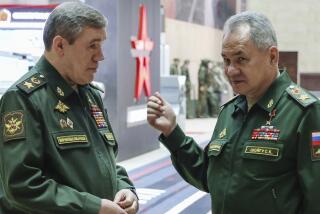Russian Officers to Face New Trial in Chechen Deaths
- Share via
MOSCOW — Russia’s Supreme Court on Tuesday ordered a new trial of four military officers who twice have been acquitted of murder charges despite admitting that they killed civilians in war-torn Chechnya.
Both sides in the high-profile case agree on key points: In January 2002, officers under the command of Capt. Eduard Ulman opened fire on a vehicle containing six unarmed Chechen civilians that had failed to stop at a checkpoint, killing one man and injuring two others. Later, the soldiers shot the survivors, returned the bodies to the vehicle, poured gasoline on it and set it on fire to make it look like a roadside mine had blown it up.
The officers testified that they had killed the survivors on direct orders from superiors to cover up their mistake, and juries in both previous trials accepted that argument. There is no protection against double jeopardy under Russian criminal law, so prosecutors were able to appeal those verdicts.
Defense lawyers and some observers argue that there has been no proper inquiry into whether commanders ordered the killings. But relatives of the victims and their supporters say that even if that were the case, the men who carried out the shootings should not walk free.
“I am glad that justice is beginning to turn our way. We wanted this for so long. But it is only half the job done. I am not sure we will live to see the other half concluded,” said Abdul-Kair Satabayev, brother of one of the victims.
“The two previous jury trials demonstrated that even seemingly unbiased jury members easily become biased when it comes to us Chechens,” he added. “I don’t think we can expect justice from a panel of Russian jurors.”
The second acquittal of the men, in May, prompted angry protests across Chechnya and from human rights organizations. Leaders of the pro-Kremlin Chechen administration complained bitterly, and about 1,000 demonstrators rallied in Grozny, the republic’s capital, carrying placards that read, “Who will defend us from terror?”
The acquittals also provided a propaganda bonanza to Chechen guerrillas fighting for independence. After the second acquittal, the rebel-linked Chechenpress website posted a statement asserting that the verdict provided justification for guerrillas to kill Russian civilians as “accomplices to genocide.”
“Today’s decision would make sense if it resulted in the investigation of those who gave the order,” Ulman’s lawyer, Roman Krzhechkovsky, said in an interview. “But this most likely will never happen, and we may now witness a new attempt to turn our defendants into scapegoats. It is really very frustrating.”
The other defendants are Maj. Alexei Perelevsky, Lt. Alexander Kalagansky and Warrant Officer Vladimir Voyevodin.
International organizations have complained for years of kidnappings, killings and other abuses allegedly committed by Russian forces in Chechnya. But only one high-ranking officer, Yuri Budanov, has been convicted for such crimes. Budanov, who was a colonel, was found guilty in 2003 of the kidnapping and murder of an 18-year-old woman and sentenced to 10 years in prison.
Chechens exercised self-rule in their Caucasus republic after defeating Russian troops in a 1994-1996 war. Russian forces, which returned in 1999, installed a pro-Kremlin administration but face a dogged insurgency.
Chechen President Alu Alkhanov told the Russian news agency Itar-Tass that the ruling for a new trial “showed the supremacy of law and justice in Russia not only to Chechen residents, but also to the whole international community.”
Alexander Cherkasov, an activist with Memorial, a human rights group, said the ruling reflected “political will” at the top.
“Obviously President [Vladimir V.] Putin doesn’t feel comfortable presiding over a country in which officers who committed a cold-blooded murder of citizens walk from the courtroom,” he said.
“But the problem is the jurors,” he added. “For them, Ulman was one of their own, whereas the Chechens he and his men killed were alien enemies. That is the result of the 10-year war in Chechnya. The government dug a dark hole in which law and reason disappear without a trace.”
The defendants alleged that Col. Vladimir Plotnikov, head of the special operation during which the incident occurred, had issued orders by radio that the survivors should be killed. Plotnikov denied this in court.
Anna Politkovskaya, an analyst for the Novaya Gazeta newspaper, said the court could not ignore Putin’s expression of shock at the acquittals.
“But that doesn’t mean at all that justice will prevail,” she said. “It will once again end up in the hands of local jurors who can’t ignore the public moods, the moods of the mob. And the moods are that Chechens can be killed and burned and no one is to blame.”
Times staff writer Sergei L. Loiko contributed to this report.
More to Read
Sign up for Essential California
The most important California stories and recommendations in your inbox every morning.
You may occasionally receive promotional content from the Los Angeles Times.













